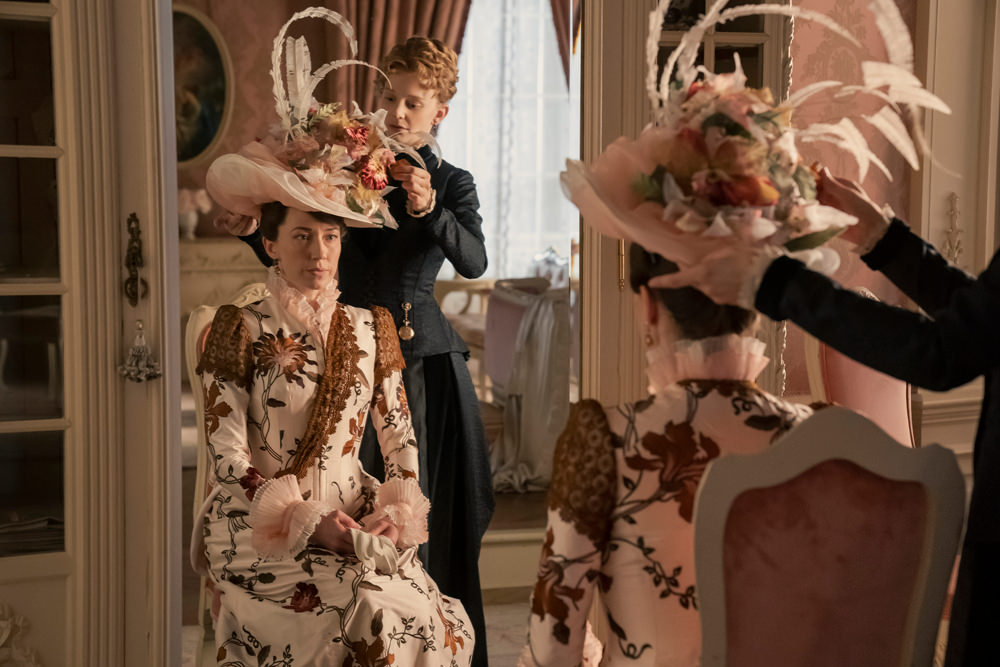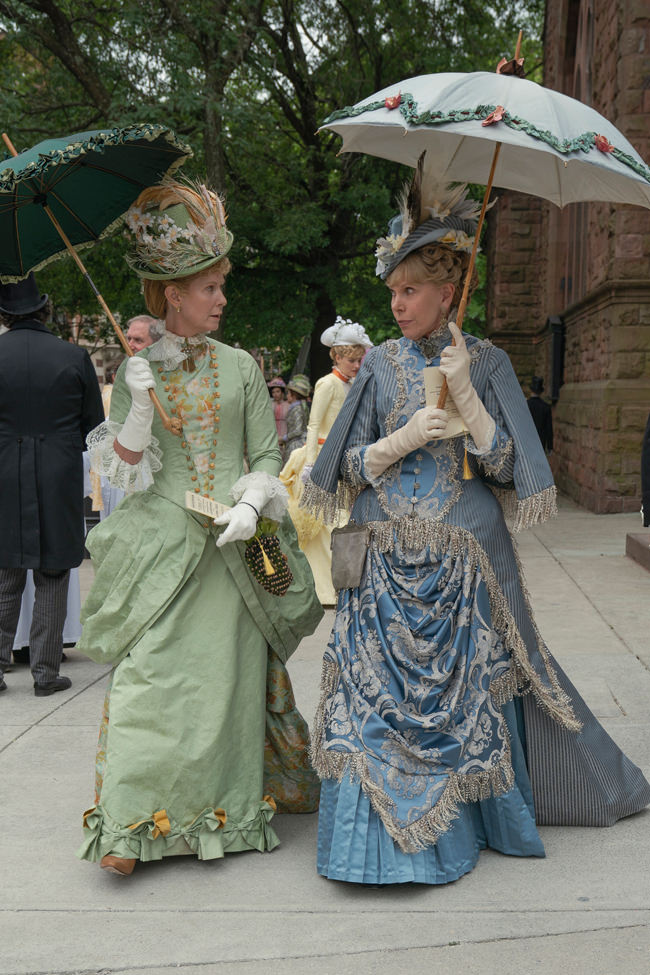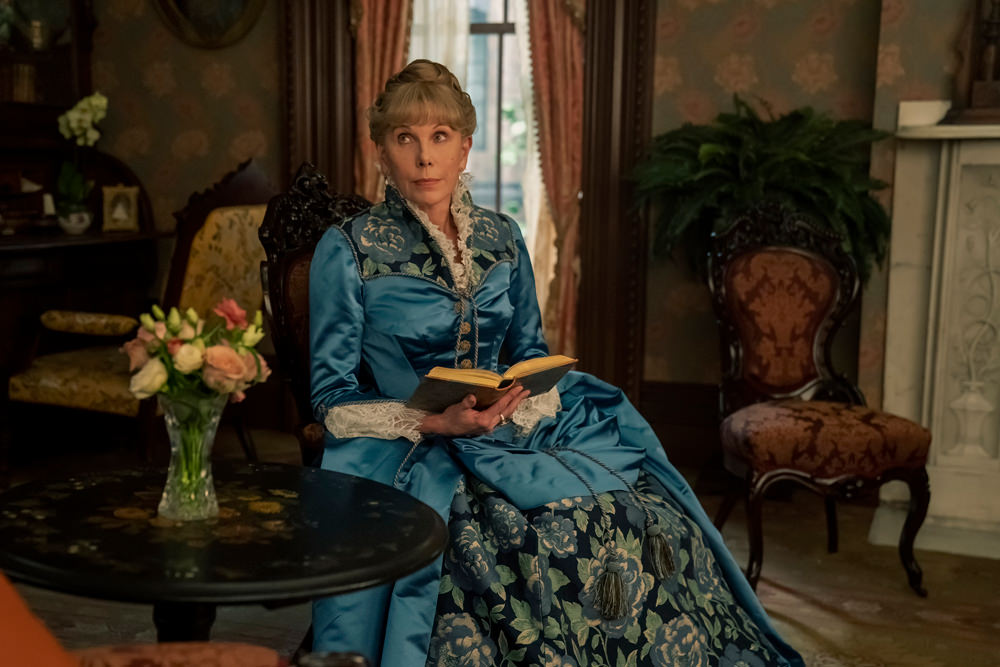
The Gilded Age is always at its best when it understands its own appeal. Show creator, executive producer and writer Julian Fellowes knows that on some level, it’s all about the hats. Also the gowns and the sets, but really, it’s a show about hats, which is why practically everyone in the cast is putting on a succession of increasingly absurd hats in the season’s opening montage. Granted, it’s Easter Sunday at a time when “Easter bonnet” was a relatively mundane term. Everyone is on their way to church – but they’re all headed to different churches, a subtle underlining of the class distinctions that define the show, dressed up in the finery that also defines the show. There’s a sort of eagerness to these opening scenes, as if there’s a rush to remind you of every reason why you came back for the second season: insane costumes, absolutely zero-stakes drama, grandiose sets, and Christine Baranski being a weensy bit of a bitch. We are efficiently filled in on several character developments and plot points, some of which you might have forgotten, such as Bertha’s twin obsessions with Newport and attaining a box at the opera (as well as her ongoing rivalry with Mrs. Astor), Bertha’s chef Mr. Borden, who used to be Monsieur Baudin before his rather silly ruse was discovered, Agnes’ … hall boy? Footman? Under Butler? Jack who makes the moves on Miss Weber, Bertha’s ladies maid, Agnes’ and Mrs. Astor’s glacial greetings to Bertha in church, and other such narrative frippery. In between news of Agnes’ nephew suddenly appearing, the introduction of a new pastor to the elite money of New York (Robert Sean Leonard), and the rather hilariously clumsy reveal that Marian’s former fiance is about to be married, we check in on the Scott family, who are distressingly, and for a time, rather confusingly miserable at the moment.
Last season ended with the reveal that Peggy had a secret child who was given away by her father, who told her that the baby had died. Upon learning her son was still alive, Peggy vowed that she would find and reclaim him. We wrote at the time that we hated this development for her. She has way too much going on as a character of importance and significance apart from the machinations of the uber-wealthy and their servants to be saddled with a recycled Edith Crawley storyline from Downton Abbey. Well, Fellowes and his co-creator Sonja Warfield must have realized the same thing, because this poor baby was written out permanently before it could get a second of screen time. This all made for a rather confusing series of interactions in their opening scenes with people who barely got introduced having deeply emotional conversations about a character we’ll never see, regarding a plot development that was a complete 180 from its introduction. From “As God is my witness, I will find my baby and take him home!” to “As God is my witness, I will never forget my dead baby” in what amounts to about four minutes of screen time between scenes. It was a lot to foist on the viewer, but it was even more to foist on the actors. Audra McDonald and Denee Benton are fantastic in these roles, but it really felt like they were struggling to connect with the material here. These characters and actors deserve better, but fortunately, this entire plotline got wrapped up — or dropped, if you want to be more blunt about it — rather quickly. While the show’s choice to focus on the 19th century Black elite of New York (and in this case, Philadelphia) is one of its best aspects, we’re hoping this sudden shift in Peggy’s life is an attempt to get her character back on track.
In less dour news, Agnes’ mysterious nephew is quickly described as a widower who is most definitely not related to Marian. As for her, she has some sort of secret about where she spends her Thursdays and we’re clearly meant to assume the worst about this development, although the mystery is also quickly dispensed with. Outside church, Hot Mr. Russell is having a conversation with another beard and top hat about union trouble. They agree to get “the other owners together,” “Gould, Morgan, even Billy Vanderbilt, if he’ll come.” League of Bearded Gentlemen, Assemble. Also, Oscar Van Rijn, still gay, still kind of pathetic about Gladys Russell, who has no time for him, not to mention his former lover John Adams, who also appears to have moved on. Oscar finds himself drinking in an underground gentleman-who-like-gentlemen bar and picks up a trick, which quickly goes very badly for him. When he stumbles in the front door bloodied and collapsing, Marian runs downstairs and yells at all of the servants, proving that she’s more Agnes Van Rijn’s niece than she’ll ever admit. Ada stops by her room later and asks how she’s feeling after hearing that Tom Raikes is getting married. She says she wants to know what’s next for her and isn’t particularly interested in a husband, although we don’t believe her at all on that latter point. For one, it’s not like she’s in a position to entertain several options in terms of her life course and for another, she has no skills and no real ambition, so a career doesn’t seem all that likely, given the odds. Ada of all people assures her that the right man will come along and explains that she was too much of a loser to attract one when she was Marian’s age.

Bertha takes Ward McCallister on a tour of her new Newport cottage. In Foghorn Leghorn’s voice, he reminds her that she has conquered New York and she is likely to conquer Newport just as handily. She notes that she still doesn’t have a box at the Academy. Larry Russell takes them on a tour of his additions and changes to the house. Ward recommends him for a job refurbishing a wealthy widow’s Newport house. Given the amount of time devoted to this topic, we figure this is all going somewhere and we’ll be meeting the widow in question shortly. Ward informs a curious Bertha that Newport allows the woman “more freedom.”
Oscar’s former lover John Adams comes to visit him, figures out the details of what happened to him immediately, and asks how long he can keep going on this way. Oscar agrees, and mentions wanting to pursue “a more grownup life,” which doesn’t sound at all like something someone would say in the 1880s. John scoffs at the idea of Oscar getting married and settling down, but Oscar notes quite rightly that he’s not doing anything thousands of their kind haven’t done before. John assures him that he’ll never go down that road himself. “I have no desire to lock away who I am in a box and throw away the key,” which really doesn’t sound like something someone would say in the 1880s. Bridget the kitchen maid walks in on John kissing Oscar’s hand and pretends not to notice, but you just know that devious ladies maid is going to pry it out of her.
Mrs. Astor pays a visit to Bertha to attempt to smooth things over after having heard from Ward McCallister how unhappy she is about the Academy passing her over for a box once again. We just love typing sentences like that. They’re so silly. Anyway, Mrs. Astor assures her “Your day will come, my dear.” Despite the significant shift in their relationship this meeting represents, Bertha has no problem pushing against the doyenne when she disagrees with her. Mrs. Astor tells her that she’s proud of how far Bertha’s come, and she even manages to make it sound like she believes that. She warns Bertha that she could undo all of her own hardwork if she throws in with the new Metropolitan Opera House, with its ghastly and inexclusive 120 boxes up for grabs. Bertha proposes a dinner, because that is literally the only thing any of them know how to do, and asks Mrs. Astor to come. She says she will need to see the guest list first. Bertha doesn’t call her a stuck up bitch so you can tell she’s really trying.
Things are still dire in the Scott household. Dorothy can’t forgive Arthur for taking their grandson away and Peggy just wants to be rid of all of this drama in her life. “We need a rest from each other,” she tells her parents. In no time at all, she’s asking Marian about her old job in the Van Rijn household. She also asks her how much longer she can keep her secret from her aunt, which is supposed to make us think she’s pregnant, we suppose, although last season made it pretty clear that wasn’t likely. Meanwhile, Oscar hits up cousin Aurora for a little help with Gladys Russell and eventually, she comes around to the idea of throwing a luncheon — again, these people have exactly one solution to every single problem — to announce the arrival of their widowed-but-not-related-to-Marian cousin, whose name is Dashiell because of course it is. Bertha is furious that Aurora would hold a luncheon on the same day as her opera enthusiasts’ dinner party and again, we just want to pause and give thanks for the opportunity to write such ridiculous sentences. George Hot Beard asks if he can skip Bertha’s dinner because of “some troublesome business in Pittsburgh” and we just want to recycle a line we wrote last season, which is that Julian Fellowes will spend far more time explaining the intricacies of a place setting than he will on any plots involving business, law or medicine. Anyway, Bertha reminds him that opera boxes are like, the wheels of society or something. Bertha notes that she’s happy to Mrs. Astor’s friend but she’ll never be her lackey.
Luncheon at the Fane Castle. Cousin Dashiell is appropriately dashing and Marian literally reminds him that they’re not related upon being introduced to him. Just to spice this potential plotline up even further, Dashiell’s daughter turns out to be Marian’s student because she’s secretly taken a job teaching art at a private school for girls. Agnes is apoplectic, of course, and later tells Marian that everyone feels sorry for her, which Marian calls cruel and mean-spirited. Meanwhile, Oscar has shepherded Gladys off to the library to declare his intentions for her and she is, after a time, increasingly intrigued by the prospect. They make a terrible couple and anyone can see it. It’s like watching Kardashians date.

George is having a meeting with a whole bunch of other beards, including Jay Gould, who informs him through the bearskin rug on his face that these blasted workers think they have rights or some such nonsense and he’s afraid they’re going to have to all be executed. Or something. We admit, it was tough to make out what he was saying through his epic beard carpet. George informs his fellow beards that they can’t back down in the face of absurd demands like safe working conditions, but he looks really hot saying it.
“Have you combed the city for the disenchanted rich who couldn’t get a box at the Academy?” Mrs. Astor asks Bertha archly. Her opera-lovers dinner is barely underway when the drama starts erupting. Aurora tells her that she won’t go against Mrs. Astor, who is extremely nonplussed to see supporters of the Metropolitan Opera in attendance, something that really should have resulted in her leaving, since she only agreed to come if she knew who was attending. Bertha suggests (but it sounded more like a threat) that their falling out would hit the papers and it would be better if she simply stayed. She is given the hardest pitch possible, ending with an appearance by the legendary soprano Christina Nilsson, who performs for the crowd of swells like a trained monkey for hire. Mrs. Astor is furious, Bertha has once again won a round, and it all feels perfectly meaningless. Meanwhile, George Hot Beard is planning on crushing the American labor movement.
FELLOW TRAVELERS Episode 1: You’re Wonderful Next Post:
Miu Miu’s Holiday 2024 Ad Campaign Starring Emma Corrin
Please review our Community Guidelines before posting a comment. Thank you!



